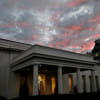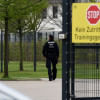Pentagon boosts cyber war against IS group

The Pentagon is expanding its cyber war against Islamic State computer networks, senior defense officials said Monday as they claimed to have seized the momentum in the 18-month-old fight against the jihadists.
Defense Secretary Ashton Carter and the US military's top officer, General Joe Dunford, told reporters the United States was determined to "accelerate" the anti-IS campaign, and indicated cyber warfare is playing an increasingly important role in doing so.
The US-led coalition is working to disrupt IS's command chain "to cause them to lose confidence in their networks," Carter said.
He did not offer technical specifics but said the tactic was to "overload their network so that they can't function, and do all of these things that will interrupt their ability to command and control forces there, control the population and the economy."
Overloading a network is a common type of cyber attack known as a denial of service, but Carter hinted that other techniques are being used.
"The methods we're using are new, some of them will be surprising and some of them are applicable to other challenges... we have around the world," he said.
Carter and Dunford visited the US Cyber Command headquarters in Fort Meade, Maryland in January and encouraged workers there to "do what they can" to intensify the fight against the IS group.
Nearly two years since it started bombing IS positions in Iraq and Syria, in a campaign that also included training and equipping local anti-IS forces, the US-led coalition is now focusing on cyber tactics.
'MOMENTUM NOW ON OUR SIDE'
While the IS group maintains a firm grip on vast areas of Iraq and Syria, the jihadists have suffered some serious setbacks.
In Iraq, coalition-supported Iraqi forces recaptured Ramadi, the capital of Anbar province west of Baghdad, in December.
And in recent weeks in Syria, a largely Kurdish group called the Syrian Democratic Forces, again backed up by commando training and US-led precision air strikes, encircled the town of Al-Shadadi in Hasakeh province, then moved in and recaptured it from the jihadists.
"Because of our strategy and our determination to accelerate our campaign, momentum is now on our side and not on ISIL's," Carter said, using an alternative abbreviation for the IS group.
Dunford, the chairman of the Joint Chiefs of Staff, noted the next major step in Iraq -- to retake the key city of Mosul -- is already well underway even though Iraqi officials have been skeptical that the task could be accomplished this year.
"People have confused maybe when would Mosul be secure with when will operations start," Dunford said.
"Both in terms of the cyber capability, as the secretary spoke about, as well as operations to cut the line of communications and begin to go after some of the targets in and around Mosul, those operations have already started."
For the coalition, a key prize is the recapture of Raqa, the IS group's de facto capital. Pentagon officials have suggested local forces are getting closer to mounting an assault.
Despite defeats in Iraq and Syria, the IS group has nonetheless expanded its presence in Libya.
US warplanes and drones on February 19 pulverized a jihadist training camp near the Libyan coastal city of Sabratha, killing dozens of people including an IS operative who allegedly helped plot two deadly attacks in neighboring Tunisia.
Dunford said the Pentagon was looking at ways to increase such strikes.
"Where there is opportunity to conduct operations against ISIL, to disrupt them at this point and not undermine the political process, that is where we are," he said.

 For all latest news, follow The Daily Star's Google News channel.
For all latest news, follow The Daily Star's Google News channel. 








Comments